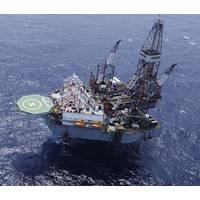The Caspian Pipeline Consortium (CPC), which brings oil from Kazakhstan to the Black Sea, plans to increase exports of CPC Blend oil by 20 percent year-on-year to 51.2 million tonnes in 2016, its head Nikolai Brunich said in an interview with Reuters.
The pipeline connects the giant Tengiz onshore field in Kazakhstan, and a number of other fields, to the sea terminal near Novorossiisk in Russia.
Despite weak global oil prices, CPC is still on track to increase the pipeline's capacity to 67 million tonnes in 2016, finishing its five-year expansion programme, according to Brunich.
The CEO hopes some of the new resources to help and fill the pipeline's expanded capacity will come from its largest supplier, Chevron (CVX)-led Tengizchevroil, which is developing the Tengiz field.
Tengizchevroil plans to increase supplies via CPC by 4 million tonnes to 30 million tonnes in 2016, Brunich said.
He also believes new volumes will come this year from Kazakhstan's giant Kashagan project and from an offshore project by Russia's second-largest oil producer Lukoil.
CPC plans to receive this year 2.5 million tonnes of oil from Kashagan and 1 million tonnes from Lukoil's Filanovsky offshore oilfield in the Caspian Sea, the chief executive added.
Kazakh Deputy Energy Minister Magzum Mirzagaliyev said in December the restart of commercial production at Kashagan was not expected until the end of 2016 and by 2020 output will reach 13 million tonnes,
Brunich added he expected CPC to export 45 million tonnes of Kazakh oil and about 6 million tonnes of Russian oil in total in 2016. Russia owns 31 percent of CPC, while Kazakhstan holds a 21-percent stake and Chevron has a 15-percent stake.
(Reporting by Gleb Gorodyankin and Alla Afanasyeva; Writing by Polina Devitt)












